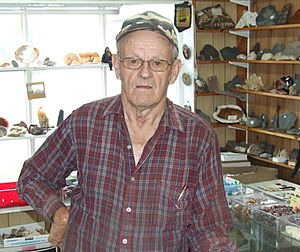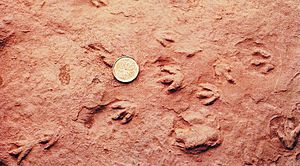Eldon George facts for kids
Quick facts for kids
Eldon George
|
|
|---|---|

George in 2013
|
|
| Born | May 10, 1931 Parrsboro, Nova Scotia, Canada
|
| Died | November 29, 2018 (aged 87) |
| Occupation | Fossil collector Geologist |
Eldon Thomas George (May 10, 1931 – November 29, 2018) was a Canadian fossil collector and amateur geologist. He made many important discoveries along the shores of Minas Basin and the Bay of Fundy. He started hunting for fossils and minerals in the 1940s.
In 1984, George found the world's smallest dinosaur tracks near Parrsboro, Nova Scotia, Canada. His other amazing finds included many different fossilized amphibian and dinosaur footprints. These were displayed at his Parrsboro Rock and Mineral Shop and Museum. One print was 17-inch (43 cm) long. It might have been made by a two-legged, crocodile-like creature that was nearly 20 feet (6.1 m) long. George also discovered a fossilized insect with three pairs of wings. He found a tiny horseshoe crab fossil too, which helped fill a "missing link" in the area's natural history.
George was very interested in mineralogy, the study of minerals. He strongly supported making stilbite the official provincial mineral of Nova Scotia.
Over the years, George's discoveries and stories were shared in many famous publications. These included The Christian Science Monitor, The New York Times, and National Geographic. He also appeared in a five-part CBC Television series called Geologic Journey, which was narrated by David Suzuki.
Contents
Who was Eldon George?
Eldon George was born in Parrsboro, Nova Scotia, Canada, in 1931. His journey as an amateur geologist began when he was nine years old. He broke his right arm in a fall. His arm didn't heal well, so he couldn't play sports with his friends. Instead, he started exploring the beaches and cliffs near his home. He collected rocks and semi-precious stones. He also taught himself about gemology, the study of gemstones. During his explorations, he began finding many different fossils.
In 1948, George opened his Rock and Mineral Shop and Museum in Parrsboro. He showed his huge collection of minerals and fossils there. In 2015, he sold his business and gave his collection to the Fundy Geological Museum in Parrsboro for a special display. In 1966, he helped start the Rockhound Roundup. This yearly event brought thousands of visitors to Parrsboro. Today, it is known as the annual Nova Scotia Gem and Mineral Show.
George's Amazing Fossil Discoveries
Eldon George's fossil finds changed what scientists thought. Until recently, most paleontologists (scientists who study fossils) didn't think the Fundy shoreline had many fossils. But George's many discoveries, along with those of paleontologist Paul E. Olsen, changed their minds.
On April 10, 1984, George made a discovery that got worldwide attention. It happened at Wasson Bluff, on the shores of the Minas Basin. This spot is about eight kilometres (5 mi) from Parrsboro. While riding his all-terrain vehicle (ATV) along the shore, he noticed what looked like tiny tracks. He used a pocket knife to carefully uncover five fossil trackways. They were pressed into a slab of sandstone that measured 16 × 14 inches (40 × 35 cm). At first, he thought the three-toed tracks were made by a reptile. But Paul Olsen identified them as dinosaur prints. The prints belonged to a theropod dinosaur. This dinosaur was about the size of a small bird, like a sparrow or an robin.
In 1986, a science team, including Paul Olsen, found hundreds of thousands of fossils at Wasson Bluff. This was one of the largest fossil finds ever.
Why are Fundy Fossils Important?
Fossil discoveries on the Fundy shoreline are very important. This is because they are about 200 million years old. This time marks the boundary between the Triassic and Jurassic geological periods. During this time, about half of Earth's living creatures suddenly died out. This event led to the rise of dinosaurs and the mammals that came after them. Many fossils from that time are still hidden. They are buried under forests, farms, or cities in North America. But the strong Fundy tides constantly uncover them in the cliffs that George explored his whole life. George once said, "The tides here are like 20,000 bulldozers, excavating and changing the land every day."
Eldon George passed away on November 29, 2018, at the age of 87.
Awards and Honours
In 2013, George received the Order of Nova Scotia. This is the highest honour in the province. He was recognized for his fossil discoveries, his community leadership, and for bringing global attention to Nova Scotia's geological history. The award summary stated: "His lifelong passion for fossil collecting and his rare finds have brought world experts to his doorstep."
The Atlantic Geoscience Society gave Eldon George the Laing Ferguson - Distinguished Service Award in 2013. This award honours people who make "exceptional and unselfish contributions to the Atlantic Geoscience Society." It also recognizes those who "encourage public appreciation of Atlantic Geoscience over a long period of time."
In 2014, George also received a Tourism Champion award. This award came from the Tourism Industry Association of Nova Scotia.


